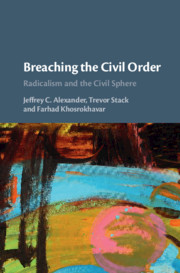Book contents
- Breaching the Civil Order
- Breaching the Civil Order
- Copyright page
- Epigraph
- Contents
- Figures
- Contributors
- Preface
- Introduction
- 1 Wedging Open Established Civil Spheres
- 2 Radical Protest on a University Campus
- 3 Antiracism Movements and the US Civil Sphere
- 4 The Civil Sphere and Its Variants in Light of the Arab Revolutions and Jihadism in Europe
- 5 Restaging a Vital Center within Radicalized Civil Societies
- 6 Anti-immigrant Movements and the Self-Poisoning of the Civil Sphere
- 7 The Civil Sphere and Revolutionary Violence
- 8 “We All Came Together That Day”
- 9 Disobedience in Civil Regeneration
- Commentary
- Conclusion
- Index
- References
4 - The Civil Sphere and Its Variants in Light of the Arab Revolutions and Jihadism in Europe
Published online by Cambridge University Press: 25 November 2019
- Breaching the Civil Order
- Breaching the Civil Order
- Copyright page
- Epigraph
- Contents
- Figures
- Contributors
- Preface
- Introduction
- 1 Wedging Open Established Civil Spheres
- 2 Radical Protest on a University Campus
- 3 Antiracism Movements and the US Civil Sphere
- 4 The Civil Sphere and Its Variants in Light of the Arab Revolutions and Jihadism in Europe
- 5 Restaging a Vital Center within Radicalized Civil Societies
- 6 Anti-immigrant Movements and the Self-Poisoning of the Civil Sphere
- 7 The Civil Sphere and Revolutionary Violence
- 8 “We All Came Together That Day”
- 9 Disobedience in Civil Regeneration
- Commentary
- Conclusion
- Index
- References
Summary
Although Civil Sphere Theory (CST) has traditionally focused on Western societies with more or less autonomous, democratic civil institutions, the existence of the civil sphere’s antidemocratic “dark side” has occasionally been acknowledged (Alexander 2013). The present chapter will work toward developing the contours of this dark side by introducing a tripartite typology of complementary spheres: the civil sphere, the uncivil sphere, and the ambivalent civil sphere. In order to illustrate this typology I will draw primarily on the 2010–12 Arab Revolutions and the twenty-first-century jihadist movement in Europe.
- Type
- Chapter
- Information
- Breaching the Civil OrderRadicalism and the Civil Sphere, pp. 92 - 122Publisher: Cambridge University PressPrint publication year: 2019
References
- 2
- Cited by



